- Clone
- Poly9059 (See other available formats)
- Regulatory Status
- IVD
- Isotype
- Chicken IgY
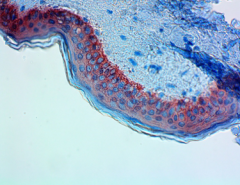
-

Anti-Keratin 5 antibody (clone Poly9059) showing strong cytoplasmic staining of the basal cells of normal human skin epidermis. -

-

| Cat # | Size | Price | Quantity Check Availability | Save | ||
|---|---|---|---|---|---|---|
| 905901 | 100 µL | 352€ | ||||
Product Details
- Product Information
-
Intended Use:
In Vitro Diagnostic (IVD). Use in immunohistochemistry (IHC) test methods only.
The polyclonal antibody Poly9059 is used for the in vitro examination of paraffin-embedded human skin tissue sections using immunohistochemistry (IHC) methods for the qualitative identification of Keratin 5. The clinical interpretation of any staining or its absence should be complemented by morphological studies and proper controls and should be evaluated within the context of the patient's clinical history and other diagnostic tests by a qualified pathologist.
- Reactivity
- Human
- Immunogen
- This polyclonal antibody was raised against a peptide sequence derived from the C-terminus of the mouse keratin 5 protein.
- Formulation
- Phosphate-buffered solution + 0.1% sodium azide.
- Preparation
- The antibody was purified by IgY affinity chromatography.
- Concentration
- 1.0 mg/mL
- Storage & Handling
- Store at -20°C. Upon initial thawing, apportion into working aliquots and store at -20°C. Avoid repeated freeze-thaw cycles to prevent denaturing the antibody. For long-term storage, keep the antibody at -80°C.
- Recommended Usage
-
Each lot of this antibody is quality control tested by immunohistochemical staining of formalin-fixed paraffin-embedded sections of human skin.
The optimal working dilution should be determined for each specific assay condition.
• IHC: 1:200 -1:1,000 with a biotin based detection system such as biotinylated anti-chicken immunoglobulin and USA Ultra Streptavidin Detection (Cat. No. 929501).
Positive Control tissue: Human skin
Tissue Sections: Paraffin-embedded tissues
Pretreatment: For optimal staining, the sections should be pretreated with an antigen unmasking solution such as Sodium Citrate H.I.E.R Retrieval solution (Cat. No. 928502).
Incubation: 60 minutes at room temperature - Application References
-
- Yuspa SH, Kilkenny AD, Steinert PM, Roop DR. Expression of murine epidermal differentiation markers is tightly regulated by restricted extracellular calcium concentrations in-vitro. J Cell Biol 109:1207-1217, 1989.
- Roop DR, Cheng CK, Titterington L, Meyers CA, Stanley JR, Steinert PM, Yuspa SH. Synthetic peptides corresponding to keratin subunits elicit highly specific antibodies. J Biol Chem 259:8037-8040, 1984.
- RRID
-
AB_2565054 (BioLegend Cat. No. 905901)
- Disclaimer
-
WARNINGS AND PRECAUTIONS
- Use appropriate personal protective equipment and safety practices per universal precautions when working with this reagent. Refer to the reagent safety data sheet.
- This antibody contains sodium azide. Follow federal, state and local regulations to dispose of this reagent. Sodium azide build-up in metal wastepipes may lead to explosive conditions; if disposing of reagent down wastepipes, flush with water after disposal.
- All specimens, samples and any material coming in contact with them should be considered potentially infectious and should be disposed of with proper precautions and in accordance with federal, state and local regulations.
- Do not use this reagent beyond the expiration date stated on the label.
- Do not use this reagent if it appears cloudy or if there is any change in the appearance of the reagent as these may be indication of possible deterioration.
Related FAQs
Customers Also Purchased
Compare Data Across All Formats
This data display is provided for general comparisons between formats.
Your actual data may vary due to variations in samples, target cells, instruments and their settings, staining conditions, and other factors.
If you need assistance with selecting the best format contact our expert technical support team.
-
Keratin 5 Polyclonal Chicken Antibody, Purified
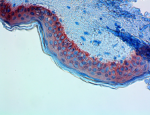
Anti-Keratin 5 antibody (clone Poly9059) showing strong cyto... 

-
Purified anti-Keratin 5 Polyclonal Chicken
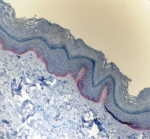
IHC staining of anti-Keratin 5 antibody (Poly90590) on forma...
 Login / Register
Login / Register 



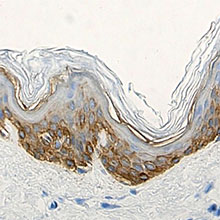
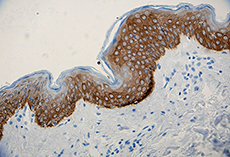

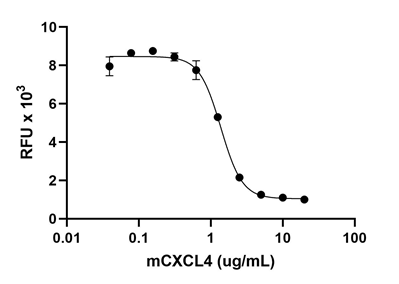



Follow Us